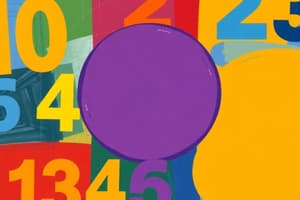Podcast
Questions and Answers
What does the commutative property state?
What does the commutative property state?
- Orders of numbers matter.
- The number is always the same.
- Reciprocals equal 1.
- #'s can be in any order. (correct)
What does the associative property indicate?
What does the associative property indicate?
Orders of #'s matter; only can switch around the parentheses.
What is the identity property?
What is the identity property?
The number is always the same.
What does the inverse property state?
What does the inverse property state?
What does the zero product property imply?
What does the zero product property imply?
What is the distributive property?
What is the distributive property?
What does the reflexive property state?
What does the reflexive property state?
The symmetric property states that if ____ then ____. The opposite of whatever it is.
The symmetric property states that if ____ then ____. The opposite of whatever it is.
The transitive property states that if ____ and ____, then ____.
The transitive property states that if ____ and ____, then ____.
Flashcards are hidden until you start studying
Study Notes
Algebraic Properties
-
Commutative Property:
- Order of numbers does not affect the result in addition or multiplication (e.g., a + b = b + a).
-
Associative Property:
- Grouping of numbers can change; only the placement of parentheses matters (e.g., (a + b) + c = a + (b + c)).
-
Identity Property:
- A number remains unchanged when adding zero or multiplying by one (e.g., a + 0 = a and a × 1 = a).
-
Inverse Property:
- Each number has a reciprocal that will equal one when multiplied (e.g., a × (1/a) = 1).
-
Zero Product Property:
- The product of any number and zero is always zero (e.g., a × 0 = 0).
-
Distributive Property:
- Multiplication distributes over addition; multiplying a number by a sum is the same as multiplying each addend by the number (e.g., a(b + c) = ab + ac).
-
Reflexive Property:
- A number is always equal to itself (e.g., a = a).
-
Symmetric Property:
- If one quantity equals another, then the second quantity equals the first (e.g., if a = b, then b = a).
-
Transitive Property:
- If one quantity equals a second, and the second equals a third, then the first equals the third (e.g., if a = b and b = c, then a = c).
Studying That Suits You
Use AI to generate personalized quizzes and flashcards to suit your learning preferences.




